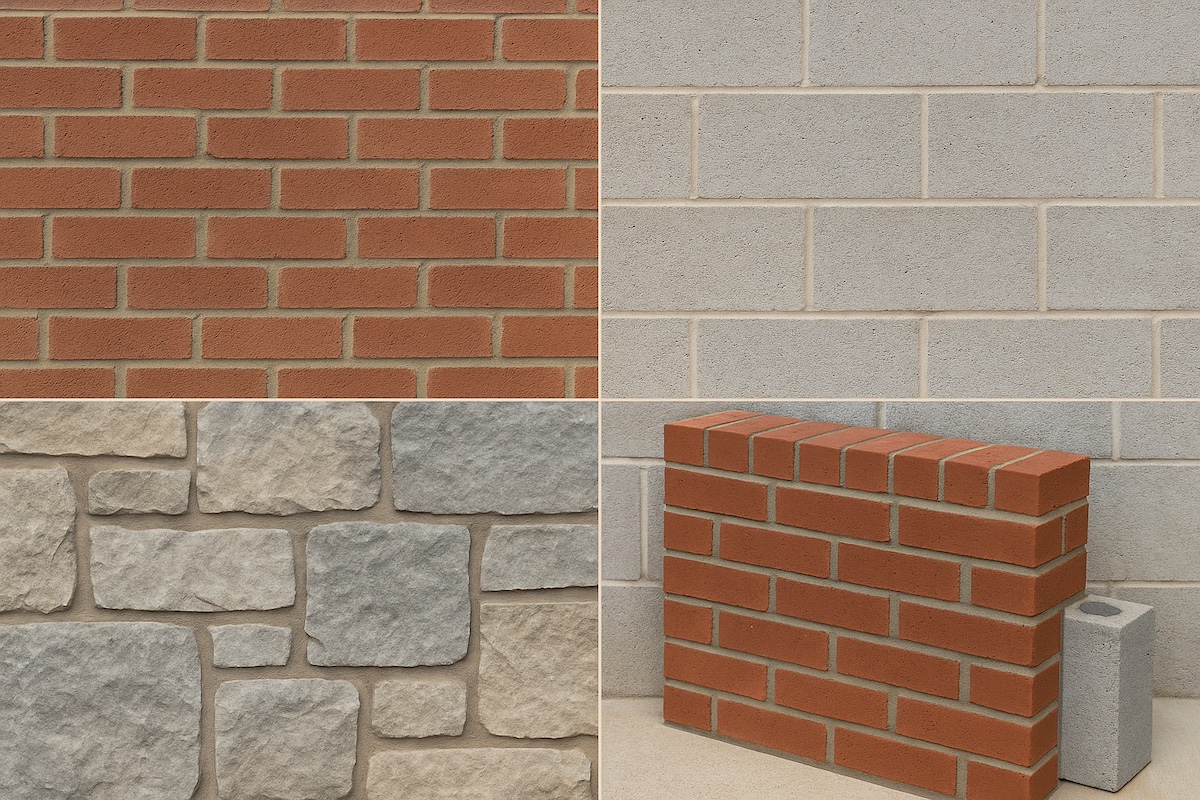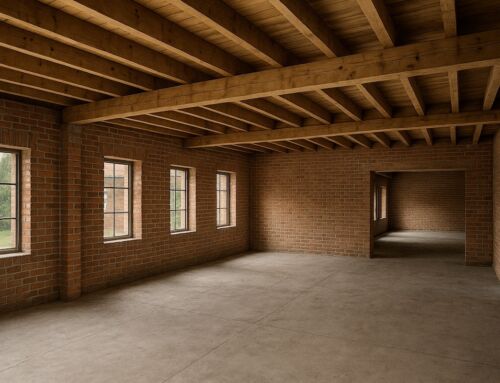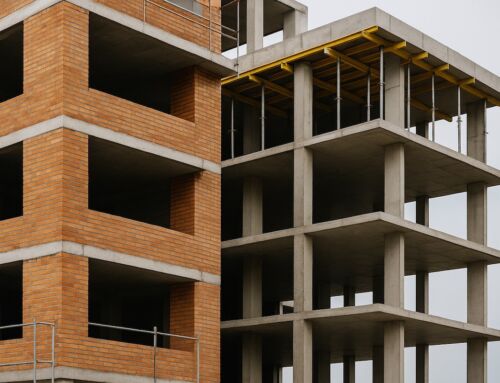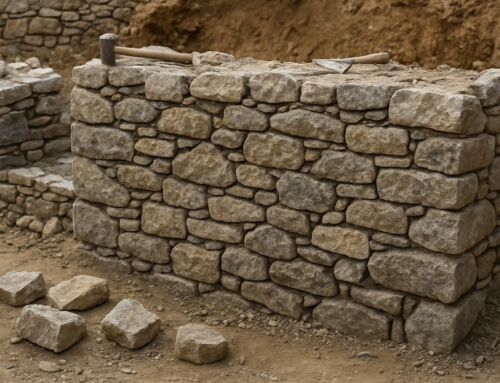Masonry has long been a trusted method in commercial construction, offering strength, durability, and timeless aesthetics. Whether you’re developing a retail center, office complex, or educational facility, the type of masonry you choose impacts everything from structural integrity to long-term maintenance.
This guide is designed to help contractors, developers, and business owners understand the most common masonry types used in commercial construction and how to select the right one for your project.
What Is Masonry in Commercial Construction?
Masonry involves constructing buildings from individual units, like bricks, blocks, or stones—bonded together with mortar. It’s valued for its robustness, fire resistance, thermal performance, and classic appearance.
In commercial construction, masonry serves both structural and decorative purposes, offering long-lasting solutions for buildings that need to stand the test of time and usage.
Benefits of Masonry in Commercial Projects
- Fire Resistance: Non-combustible materials reduce fire risk
- Durability: Withstands harsh weather and wear
- Low Maintenance: Requires minimal upkeep over decades
- Energy Efficiency: Excellent thermal mass helps regulate interior temperatures
Main Types of Masonry Used in Commercial Projects
1. Brick Masonry
Brick masonry is one of the oldest and most widely used forms of construction. Bricks made from clay are laid in specific patterns and bonded with mortar to create solid walls.
Best For:
Schools, hospitals, and office buildings
Pros:
- Aesthetic versatility
- Fire-resistant
- Long lifespan
Cons:
- Labor-intensive
- Can be more expensive than concrete
2. Concrete Block Masonry (CMU)
Concrete masonry units (CMUs) are made from cement, water, and aggregates. These large blocks are known for their strength and are often used in large-scale commercial buildings.
Best For:
Warehouses, industrial facilities, commercial garages
Pros:
- Cost-effective
- Easy to install
- Strong load-bearing capacity
Cons:
- May require finishing for aesthetics
- Heavier than other masonry types
3. Stone Masonry
Stone masonry involves using natural stones like granite, limestone, or sandstone. It’s often used in projects that emphasize durability and visual appeal.
Best For:
Museums, banks, and government buildings
Pros:
- Premium appearance
- Extremely durable
- Weather-resistant
Cons:
- High material and labor cost
- Heavy and requires skilled labor
4. Veneer Masonry
Veneer masonry is a non-structural layer attached to the outside of a wall to give the look of full-depth masonry without the weight or cost.
Best For:
Retail shops, restaurants, and office exteriors
Pros:
- Lightweight
- Affordable aesthetic option
- Can be applied to a variety of surfaces
Cons:
- Less durable than full-depth masonry
- May require sealing to prevent moisture issues
5. Glass Block Masonry
Glass blocks are used more for decorative and lighting purposes than for structural integrity. They allow natural light in while maintaining privacy.
Best For:
Stairwells, commercial restrooms, entryways
Pros:
- Enhances natural lighting
- Adds a unique architectural element
- Provides some insulation
Cons:
- Limited structural use
- Can be expensive per unit
6. Reinforced Masonry
Reinforced masonry incorporates steel bars and grout within masonry walls for added strength, especially in areas with seismic activity.
Best For:
Multi-story buildings and commercial centers in seismic zones
Pros:
- High structural strength
- Improved safety and longevity
- Complies with building codes in high-risk areas
Cons:
- More complex to install
- Higher material costs
Factors That Influence Masonry Selection in Commercial Projects
When selecting the right masonry type, several factors come into play:
- Budget: Veneer and CMU options are more budget-friendly
- Load-Bearing Needs: Reinforced or block masonry is better for heavy structural loads
- Aesthetic Goals: Choose stone or brick for a classic, high-end look
- Local Climate: Masonry types vary in weather resistance
- Regulations: Local building codes may favor fire-resistant and reinforced systems
Modern Innovations in Masonry
Today’s commercial masonry includes more than just traditional methods. Innovations are helping reduce costs and increase performance:
- Precast Masonry Systems: Built off-site, reducing labor time on-site
- Insulated Concrete Blocks: Improve thermal efficiency
- Thin Veneers: Deliver high-end looks with lower installation costs
- Building Information Modeling (BIM): Allows for precise planning of masonry within the larger structure
Masonry Construction Process in Commercial Settings
- Design & Planning: Architects determine layout and structure
- Material Selection: Based on load, aesthetics, and budget
- Foundation Work: Prepares the base for masonry walls
- Laying Units: Using different bond patterns (e.g., running bond, stack bond)
- Curing: Mortar hardens and strengthens over time
- Finishing: Includes sealing, painting, or cladding
Masonry vs. Other Commercial Construction Methods
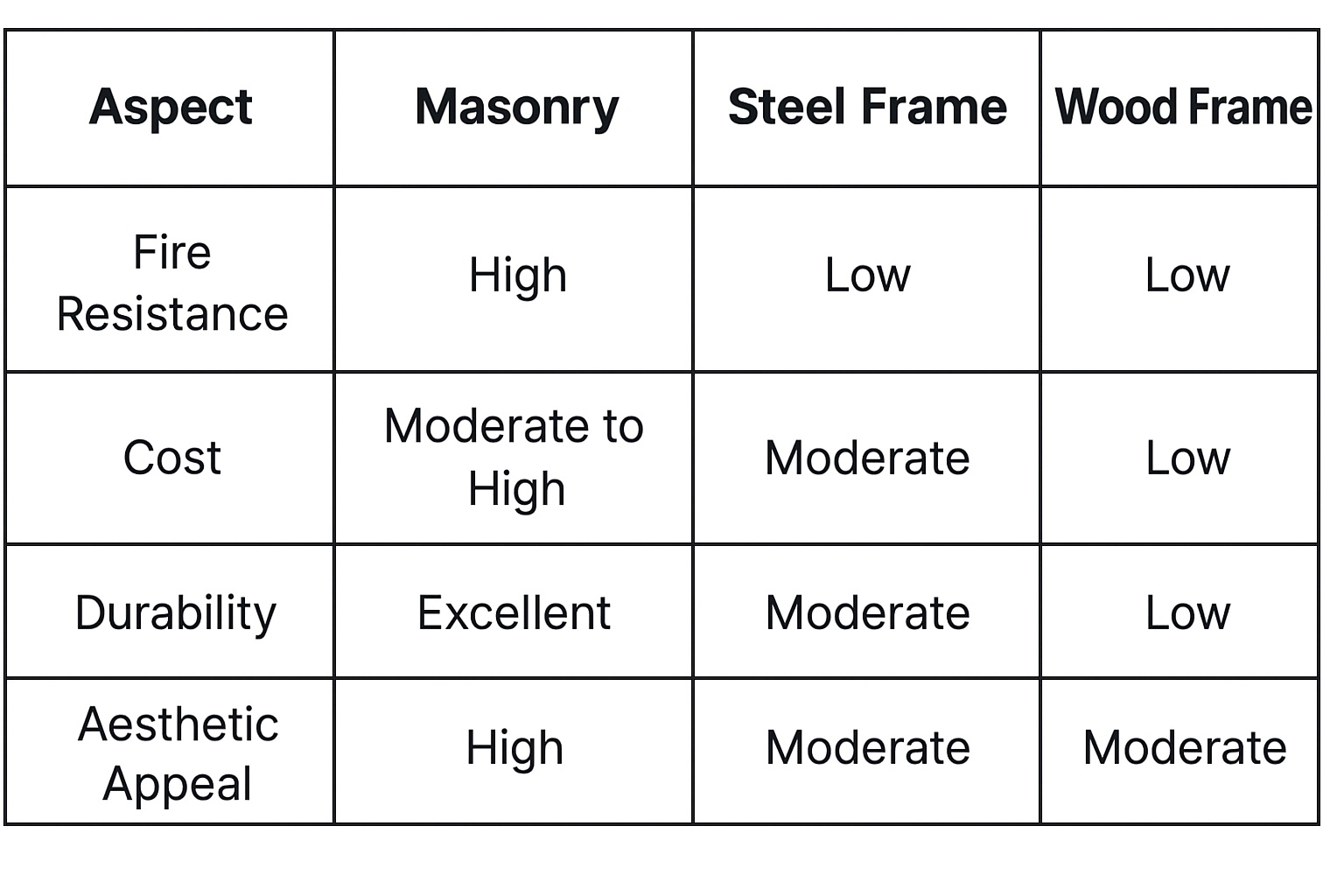
Masonry is preferred for buildings that demand longevity, insulation, and low maintenance.
Common Issues and Maintenance Tips
While masonry is low maintenance, you should still watch for:
- Cracks: Can form from settling or extreme weather. Repointing is the solution
- Efflorescence: White powder from salts—can be cleaned
- Water Penetration: Use sealants to prevent moisture issues
- Discoloration: Regular inspections can prevent deeper structural problems
FAQs
What type of masonry is best for commercial buildings?
Concrete block masonry (CMU) is the most cost-effective and structurally sound option, but brick or stone masonry may be chosen for aesthetics.
How long does masonry construction last in commercial projects?
Properly maintained masonry structures can last over 100 years.
Is masonry more expensive than other commercial construction methods?
Initial costs may be higher, but lower maintenance and energy savings often make it more cost-effective over time.
What is the difference between structural and veneer masonry?
Structural masonry supports the building, while veneer masonry is decorative and sits on an existing wall.
Can masonry be used in seismic zones?
Yes. Reinforced masonry is specifically designed for areas prone to earthquakes.
Conclusion: Built to Last with Dixon Inc
At Dixon Inc., we understand that your commercial building is more than just a structure—it’s a long-term investment. That’s why we specialize in durable, expertly crafted masonry solutions tailored to your specific needs.
Whether you’re building a school, retail center, or industrial facility, our team helps you choose the right type of masonry, ensuring strength, style, and long-term performance. With decades of experience and a commitment to quality craftsmanship, Dixon Inc. is your trusted partner in commercial construction.
Ready to build something that lasts? Contact Dixon Inc. today and let’s bring your vision to life with the perfect masonry solution.

